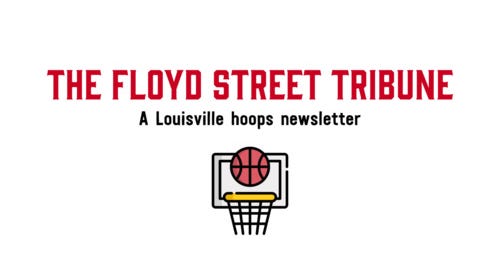The Floyd Street Tribune: In three games, a clear view of Louisville's statistical, stylistic changes
Inside: With a new offensive system and an evolving defensive scheme, Louisville observers can expect (1) bumps in the road and (2) a very different statistical profile.
Thanks for reading The Floyd Street Tribune! Missed the previous newsletters? That’s OK. With a paid subscription, you can access all of ‘em here. In the previous edition, I broke down what concerned me and what didn’t about Louisville’s season opener — and a lot has happened since.
No sugarcoating allowed in The Floyd Street Tribune: Friday’s loss to Furman was a serious disappointment for Louisville. It was an immediate coming-to-fruition of the primary early-season warning sign for the Cards: They have trouble guarding drivers, both as on-ball and gap-help defenders. Furman exposed that.
Today’s newsletter will focus on the good news and bad news of Louisville’s start to the season, and we’ll parse some early numbers to show how the Cardinals are changing offensively and defensively and where their statistical profile may be headed this campaign. Plus, we get a tease of the latest Floyd Street’s Finest podcast with a few comments from Noah Locke, this week’s guest. (The episode will be out today.)
The defensive numbers
One of these is not like the other. Louisville’s defensive performance against Navy was a significant improvement after the Furman loss. The moment that stuck out to me was El Ellis’s on-ball defensive pressure that led to a turnover and quick transition bucket, and Ellis turning to the bench and flexing as his teammates celebrated the defensive work. That intensity, from most of the Cards squad, had been missing in the first two games.
The bottom line is, the numbers reflected Furman’s ability to attack defenders and navigate Louisville’s gap-help defense, allowing the Palladins to kick back out to open shooters (16 assists on 24 field goals/12 of 28 from 3-point range) and draw a ton of fouls (26 free throw attempts). Nine of Furman’s 12 3s were assisted. In games where Louisville faces quick attacking guards, everything has to be better — the on-ball defender needs to consistently cut off first and second steps, and the help-gap defenders closest to the ball have to be deep enough and active enough in the gaps to discourage the continuation of a drive if their teammate is beaten.





